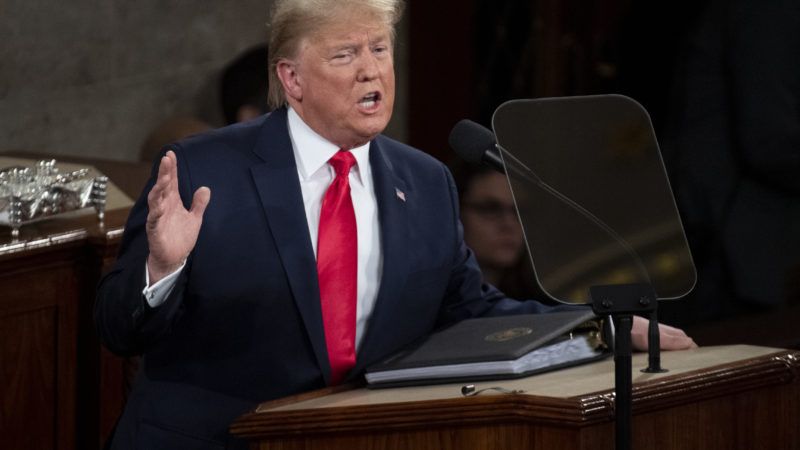Trump Bashes Socialism While Endorsing a Status Quo Socialism of His Own
The president promised to protect Medicare and Social Security, America's biggest entitlement programs.

Most people probably wouldn't think of President Donald Trump as a socialist. At last night's State of the Union address, he repeatedly inveighed against the ideology, in both foreign and domestic settings. He touted the diplomatic coalition aligned "against the socialist dictator of Venezuela, Nicolás Maduro," who he cast as an "illegitimate ruler" and "a tyrant who brutalizes his people." He warned of an impending "socialist takeover of our health care system," criticized Democrats who supported a government-run plan, and promised that he "will never let socialism destroy American health care."
"Socialism destroys nations," he said. "But always remember: Freedom unifies the soul."
There can be no doubt of Maduro's tyranny, and when the leading proponent of Medicare for All is a self-declared democratic socialist, it is more than fair to cast single-payer health care, and its backers in Congress, in this light as well. With Sen. Bernie Sanders (I–Vt.) currently a front-runner for the Democratic presidential nomination, Trump was previewing a likely attack strategy for this year's presidential contest, and attempting to exploit a growing rift in Democratic Party politics over its leftward drift.
There are sound political reasons for Trump to adopt this strategy. Polls show that Republican voters are widely opposed to socialism, and although Democrats are substantially more favorable, they are, relatively speaking, more divided. The presidential campaigns of both Sen. Kamala Harris (D–Calif.) and Sen. Elizabeth Warren (D–Mass.) showed how practical questions about how to pay for and implement Medicare for All can drag down presidential campaigns, even in a nominally receptive Democratic primary race. (Sanders, for his part, has largely dismissed such questions as impossible to answer.) Trump is on solid political ground running against America's nascent socialist movement and its primary project, the remaking of the nation's health care system.
Yet Trump's fervent anti-socialism makes for an odd fit with much of the rest of his speech, which boasted of various spending and infrastructure projects, along with a new branch of the military, Space Force. The disjointedness was particularly notable in his dual commitment to "always protect your Medicare" and "always protect your Social Security," a line punctuated by a final "always," as if to say that old-age entitlements are forever sacred.
Although Trump recently suggested, in a brief and somewhat vague exchange, that the programs might eventually be up for some sort of cost-saving reform, he has historically positioned himself as a defender of those programs. As with his attacks on socialism, there is a clear political logic to this stance: The programs are popular, and they benefit seniors, who make up a disproportionate share of Trump's voter base.
Trump's speech was a warning to these voters that Democrats would threaten their benefits by extending them to outsiders, in particular to illegal immigrants. Democratic proposals, he said, "would raid the Medicare benefits of our seniors and that our seniors depend on, while acting as a powerful lure for illegal immigration." (Nevermind that California, which he cited as an example, spends only a tiny fraction of its gargantuan health care budget on undocumented immigrants.)
Yet what are Medicare and Social Security except socialist programs limited by age requirements? They are not mandatory savings systems, as many believe, but direct transfer programs in which young workers fund the benefits of older retirees; on average, today's seniors will receive benefits that far exceed what they paid in. Indeed, the mismatch between expected revenues and the expected cost of paying for those benefits is why both programs have substantial long-term shortfalls, and why they are, in tandem, the biggest drivers of long-term federal debt.
Trump isn't a democratic socialist in the Sanders mold. But by casting Medicare and Social Security as sacrosanct, as untouchable foundations of the American project, Trump is endorsing a kind of debt-funded socialism for seniors, in which the way to access the benefits of massive government welfare programs is to turn 65. It's no wonder, really, that Bernie Sanders' base of support is younger voters; Sanders is promising, in many ways, to expand the sort of benefits that Trump wants to protect for seniors to the young and middle-aged.
There are obvious policy problems with Trump's brand of big-government anti-socialism, chief among them that it ignores the costs of running an entitlement system that was designed under wildly different demographic assumptions.
But the rise of Sanders specifically and youth socialism generally is a reminder that there are serious political ramifications as well. The seniors-only entitlement state that Trump has vowed to preserve has created an expensively protected beneficiary class. Eventually, those who are not part of that class will want benefits of their own, at even greater expense. So it's true that Sanders' particular brand of socialism is especially unaffordable and that it would exacerbate the fiscal problems associated with today's entitlement system. But Trump's preferred alternative is a politically convenient status quo that is destructive and unsustainable on its own terms.

Show Comments (238)